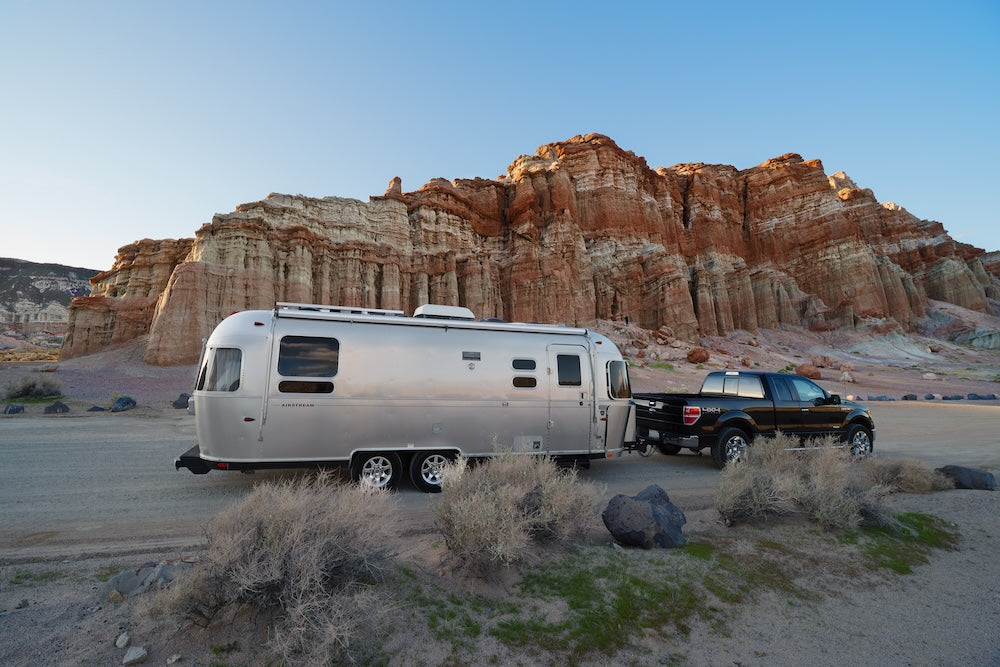Just like a house, travel trailers require regular maintenance to keep Murphy’s Law from hijacking your vacation. Fortunately, it’s possible to avoid most tire issues, leaky roofs, and funny odors…as long as you know what to check. Keep reading because we’ll cover the top areas to never overlook so you don’t become the next victim of ignored travel trailer maintenance.
Interior
First and foremost, your owner’s manual is the bible of maintaining your travel trailer. Manufacturers want to avoid repairs and recalls as much as you do, so always reference the owner’s manual first for maintenance and inspection.
Maintaining the interior of the trailer depends largely on cleanliness and long-term storage procedures. Always remove any food that could go bad and clean up so insects and animals aren’t tempted to invite themselves in. Similarly, make sure there are no points of entry animals could use to get inside.
Cleaning up for seasonal storage is also a great time to check and change air filters since they’ve likely built up dust and debris. Just like your furnace filter at home, replace air filters according to recommendations or when needed. Keep a couple of these in your trailer as a reminder to check them periodically. This also ensures you’ll have them on hand when you need a replacement.
Water Heater
Your water heater isn’t much different from the one at home and regular maintenance extends the life and keeps it in good condition. Check for debris buildup around the burner and flush out the tank annually. The goal is to avoid high sediment buildup which ultimately reduces the life of the tank.
Batteries
Fortunately, the deep cycle batteries used in your travel trailer are low maintenance. You’ll often get 4-5 years out of a quality battery. First of all, note the age of each battery and how long it’s expected to last. Prevention is the best medicine here - if it’s nearing the end of the life cycle, replace it before it inevitably fails at the worst possible time. Lastly, store your batteries properly to avoid extreme swings in temperature.
Exterior
Travel trailers are subject to demanding weather conditions and frequent exterior inspections are an easy way to fend off later issues. Inspect all windows, vents, and ducts, looking for damage from weather, animals, and age. Check any hoses, cords, or lines for cracks and inspect connection points for leaks.
Water is a top enemy and your roof is the biggest liability. With the general shape of an RV roof, they have a high risk for leaks and water damage. Don’t be afraid to climb up and closely inspect the roof seams and seals for signs of damage, cracking, and water intrusion. If your trailer has a ladder you should be able to walk around the roof, which makes it simple. If you find a seam leaking, use the appropriate sealant to stop water at the source.
Don’t forget about slides either if you have them, since these are notorious for issues. Inspect both the slide roof for leaks and the friction points to ensure they’re operating smoothly. If you notice significant wear and tear, your best bet is to contact the manufacturer or dealer for the best course of action.
Tanks
Tanks are critical to comfortable living and the required maintenance is relatively straightforward. Let’s start with the fresh water tank, which is best served by sanitizing and flushing a couple times per year. This ensures your water system is clean and safe throughout the year.
Your gray water tank is best monitored by your sense of smell. If you get any hint of unpleasant smells coming from it, use an odor control additive to tame the scent. The black water tank needs the right chemicals to break down solids for proper waste disposal. Again, use the right mix according to your owner’s manual and flush as needed.
Tires and Wheels
Of all the RV maintenance tips, never underestimate the importance of your tires. Each tire deserves an individual inspection. You’ll want to check your tire tread for uneven wear and if necessary, rotate or replace them. Always keep a tire pressure gauge in the trailer and use it frequently. Remember to check tire pressures before driving since the heat increases the PSI. A portable tire inflator and tire repair kit are also cheap insurance should you develop a slow leak and need to inflate a tire. Finally, check your lug nuts to ensure they are tightened appropriately.
If you want to up your trailer game, familiarize yourself with how to repack your wheel bearings. This is a relatively simple process and being able to do this roadside could save you time and money over the long haul. This should be done at least once a year and more if you travel a lot. Again, follow manufacturer recommendations.
You could say we saved the best for last since our wheels get us to the places we consider home away from home. In reality, overlooking any of these maintenance tips is asking for trouble. Though it may take extra time, it’s well worth it in the long run when you can stay ahead of scheduled maintenance. Not to mention, you’ll save money by avoiding unexpected repair bills - something everyone can appreciate.

